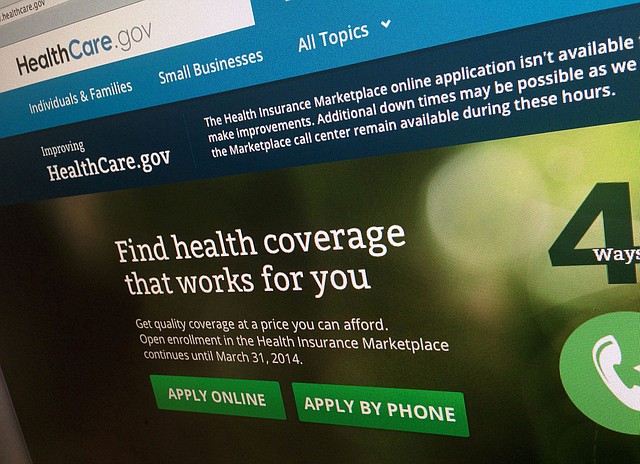Status murky, 310,000 at risk of coverage loss
This Nov. 29, 2013, file photo shows a part of the HealthCare.gov website, photographed in Washington. The administration is warning hundreds of thousands of consumers they risk losing taxpayer-subsidized health insurance unless they act quickly to resolve issues about their citizenship and immigration status.
Wednesday, August 13, 2014
WASHINGTON -- Hundreds of thousands of people who signed up under the new health care law risk losing their taxpayer-subsidized insurance unless they act quickly to resolve questions about their citizenship or immigration status.
The government warned Tuesday that they have just more than three weeks to show they're eligible.
Of the 8 million people who signed up for private coverage through President Barack Obama's law, more than 2 million at one point had discrepancies that clouded their eligibility. That number has been greatly reduced, but the remaining cases are proving difficult to untangle.
People living in the country illegally are not allowed to get coverage. Officials at the Health and Human Services Department said letters are being sent to about 310,000 people with documentation issues involving citizenship or immigration.
The letters will notify enrollees with unresolved issues that they still need to upload their documents to the healthcare.gov website by Sept. 5, or mail them in. Otherwise, their coverage will end Sept. 30.
Two states with large Hispanic populations top the list of unresolved cases. Florida has 93,800 cases, while Texas has 52,700. Georgia, Virginia and Pennsylvania round out the top five. The letters are being sent in English and Spanish.
Some supporters of the law worried that eligible consumers might lose coverage because of record-keeping problems on the government's part or because of something as mundane as letters getting lost in the mail.
"Many of these people have issues because government files are incomplete," said Ron Pollack, executive director of the advocacy group Families USA. "Many may feel that they have fully complied with what is necessary to get health coverage."
The number of problem cases was a lot larger only a few months ago, prompting criticism from congressional Republicans that the administration was signing up people ineligible under the law.
In May, there were nearly 970,000 people with documentation issues involving citizenship or immigration. About half those cases have now been closed, officials said, and another 20 percent are being worked on actively.
Previously, officials said the majority of cases are resolved in favor of the enrollee.
The new policy affects the 36 states where the federal government has taken the lead in running online insurance markets created by the law. It's unclear how it will apply in places like California and New York, which are running their own insurance exchanges.
Consumers who have unresolved discrepancies over their incomes will get notices at a later date.
The new health law provides subsidized coverage to people with no access to health insurance on the job. More than 80 percent of those signed up are getting subsidies to help with their premiums and, in some cases, their copayments and deductibles as well.
But those taxpayer subsidies are contingent on meeting a host of requirements.
The letters that started going out Tuesday won't be the final attempt to reach those with unresolved issues. The Health and Human Services Department will try to contact each consumer two more times by phone and once via email.
Consumers also can contact healthcare.gov's call center at (800) 318-2596 to see what documents they need to submit and see whether their information has been received.
The notices affect this year's coverage only.
The open enrollment period for this year is over. Open enrollment season for 2015 coverage doesn't start until Nov. 15. At that point, consumers will be able to renew or make changes in their coverage, and new customers can find out whether there's a plan that's right for them.
Under the law, most Americans are required to have health insurance or risk fines.
A Section on 08/13/2014
